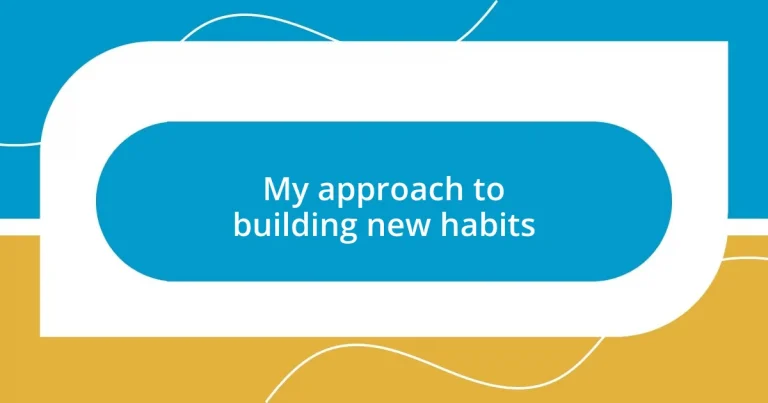Key takeaways:
- Habit formation follows a cue-routine-reward loop, emphasizing the importance of recognizing environmental cues and celebrating small victories.
- Setting clear, specific, and adaptable goals is crucial for maintaining consistency and tracking progress effectively.
- Accountability partners and support systems enhance motivation and help overcome obstacles through shared experiences and encouragement.
- Celebrating small victories boosts motivation and reinforces positive habits, making the journey of habit-building more rewarding and enjoyable.
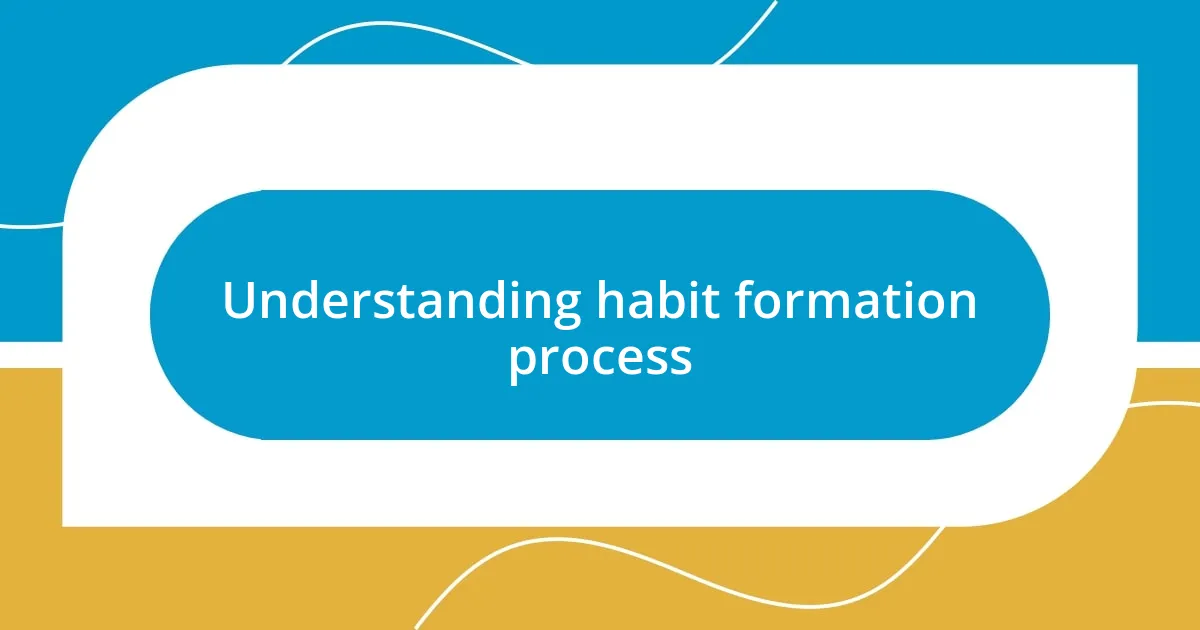
Understanding habit formation process
The habit formation process can be quite fascinating and layered. At its core, it often follows a cycle known as the cue-routine-reward loop. For instance, I remember when I wanted to start exercising regularly; the cue was the time of day I set aside for myself. That simple trigger helped me transition from lounging on the couch to lacing up my sneakers.
I’ve learned that understanding the cues in our environment is essential. When I began meditating, I noticed that my phone buzzing or the smell of my morning coffee acted as signals. Wouldn’t it make sense to use these natural moments as reminders? Viewing them as stepping stones instead of distractions changed the game for me.
And then there’s the importance of rewards. Early in my habit-building journey, I underestimated how crucial it was to celebrate small victories. Each time I finished a workout, I allowed myself a moment of pride. Isn’t it amazing how much motivation a little acknowledgment can provide? Embracing this mindset truly reinforced my commitment.
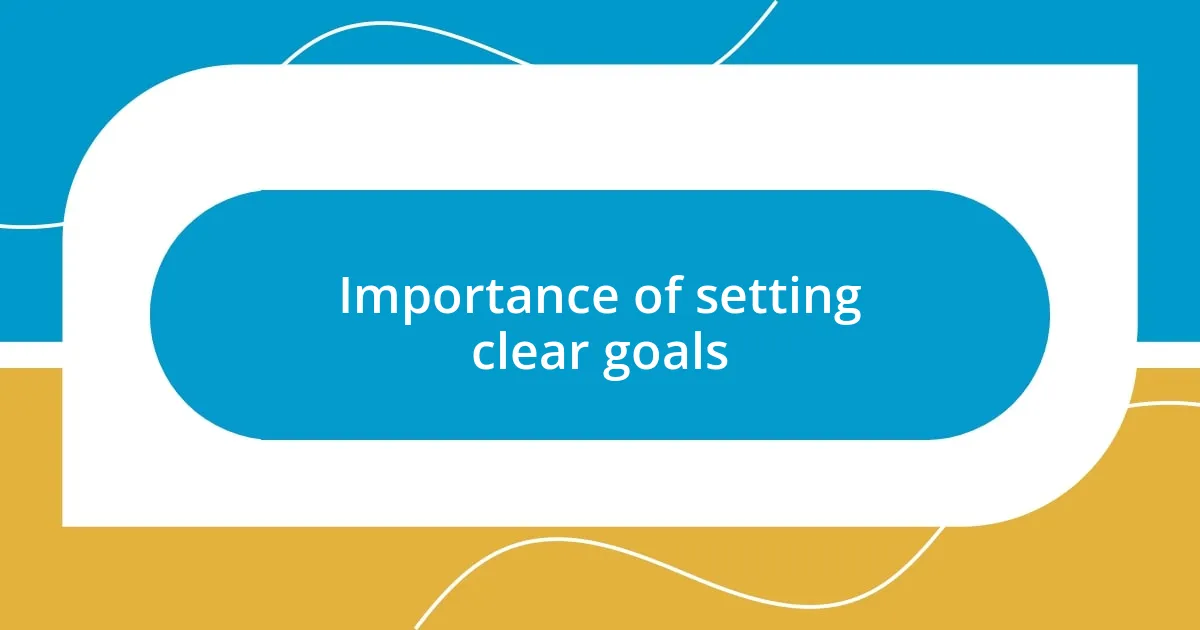
Importance of setting clear goals
Clear goals are like roadmaps on the path of habit formation. Without them, it’s easy to get lost or sidetracked. When I set out to improve my daily writing routine, I didn’t just say, “I want to write more.” Instead, I specified that I would write for 30 minutes every morning. This clarity made it much easier to stay consistent and ultimately transformed my approach.
Setting specific goals not only provides direction but also helps measure progress. When I tracked my writing sessions on a calendar, I felt a surge of accomplishment each time I checked a box. It created a visual reminder of my commitment and progress. Have you ever felt how satisfying it is to see your efforts accumulate? I certainly found that those small wins can fuel sustained motivation.
Moreover, having clear goals allows for adjustments along the journey. For instance, when my initial goal of writing 30 minutes became overwhelming, I revised it to just 10 minutes. That shift didn’t feel like a failure; instead, it became a stepping stone that ensured I still engaged with my writing daily. Adapting my goals helped me maintain momentum without feeling defeated.
| Goal Type | Description |
|---|---|
| Specific | Clearly defined, such as “exercise for 30 minutes daily.” |
| Measurable | Progress can be tracked, like checking off days on a calendar. |
| Achievable | Realistic and attainable, like starting small with 10 minutes. |
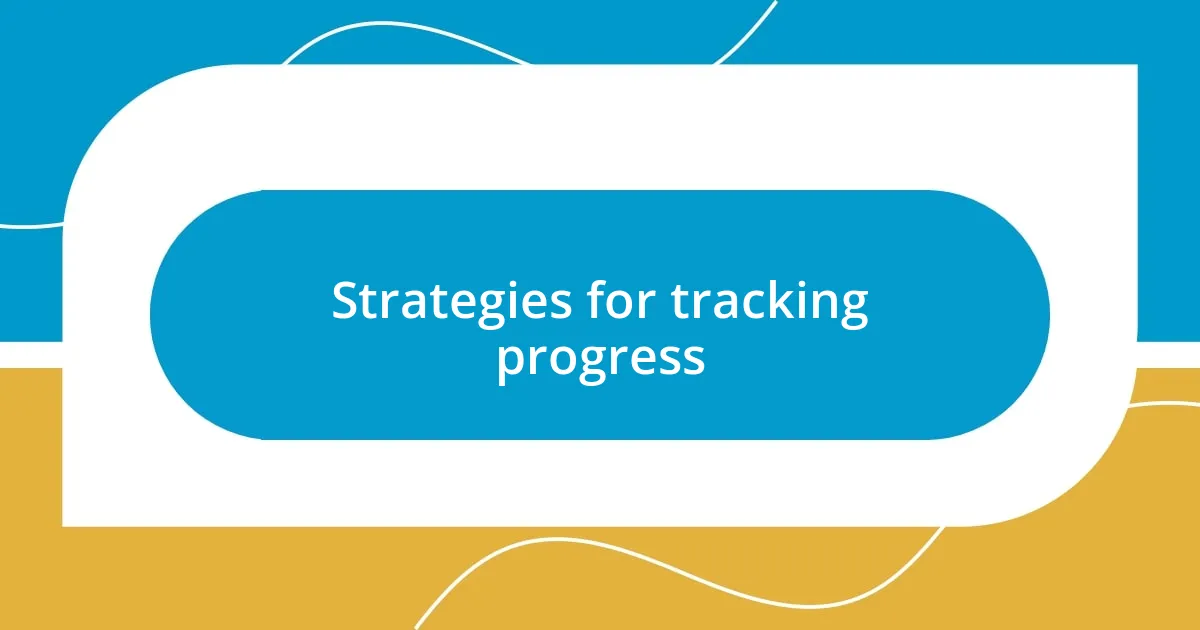
Strategies for tracking progress
When it comes to tracking progress, I’ve found that consistency is key. I started using a simple habit tracker app on my phone. At first, it felt a bit tedious to log my daily workouts or writing sessions, but soon it became a ritual I looked forward to. The satisfaction of seeing a streak grow motivated me to keep going. There’s something powerful about visualizing your effort; it’s like a badge of honor that reminds you of your journey.
Here are some effective strategies I’ve adopted for tracking my habits:
- Daily Check-ins: Set aside a few minutes each day to reflect on what you accomplished.
- Visual Charts: Use graphs to depict your progress over time. I love seeing my improvements laid out visually!
- Journaling: Maintain a habit journal to note not just your achievements, but also how you felt during the process. Writing about my emotions has helped me pinpoint what truly drives me.
- Accountability Partners: Sharing your goals with a friend or family member can create extra motivation. I often exchange progress updates, which adds a bit of friendly competition.
- Monthly Reviews: Take time at the end of each month to review what worked and what didn’t. This reflection moment can illuminate important insights.
Even when I struggled, tracking kept me anchored. I remember a week when I fell off my routine. At first, I felt defeated, but then I checked my progress and realized I had still made strides overall. This understanding helped me regain my focus. Tracking doesn’t just show how far you’ve come; it helps you stay grounded and adaptable in your pursuit of new habits.
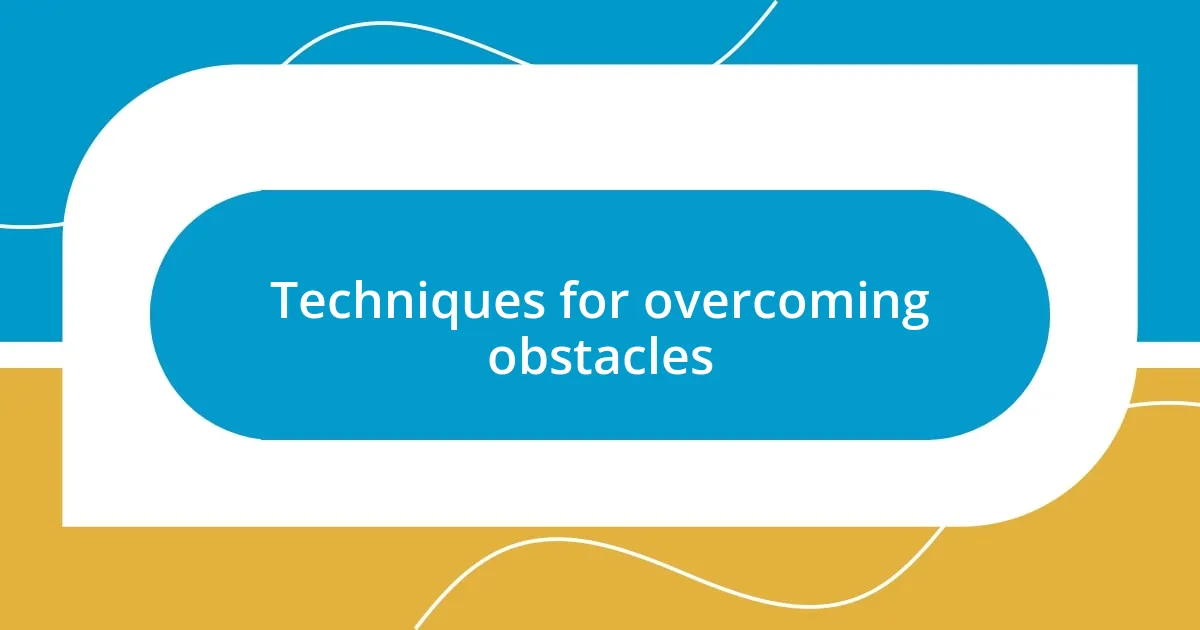
Techniques for overcoming obstacles
When faced with obstacles, I’ve learned that breaking down challenges into smaller, more manageable steps is incredibly effective. For example, when I aimed to run a 5K but struggled to stay motivated, I started by committing to just a five-minute walk each day. That small commitment made it mentally easier to start; once I was out there, I often ended up running longer than I had planned! It’s fascinating how the mind can shift from resistance to acceptance when given a gentle nudge.
Another technique that has greatly helped me is reframing negative thoughts. I remember when I hit a plateau in my writing, and it felt discouraging. Instead of thinking, “I’m not improving,” I shifted my perspective to, “I’m taking my time to develop my style.” This simple change in mindset allowed me to appreciate the process rather than solely focus on the outcome. Have you noticed how a slight shift in how we frame challenges can create a fresh outlook? It really can transform our approach and feelings.
Finally, I can’t stress enough the power of developing a support system. Sharing my goals with friends had an unexpected effect; we’d encourage each other and even hold mini-challenges. One time, I set a goal to read a certain number of books in a month, and my friend challenged me to a book club. It ignited a spark of motivation, turning a solitary activity into a fun and engaging experience. Community support can turn obstacles into stepping stones, wouldn’t you agree?
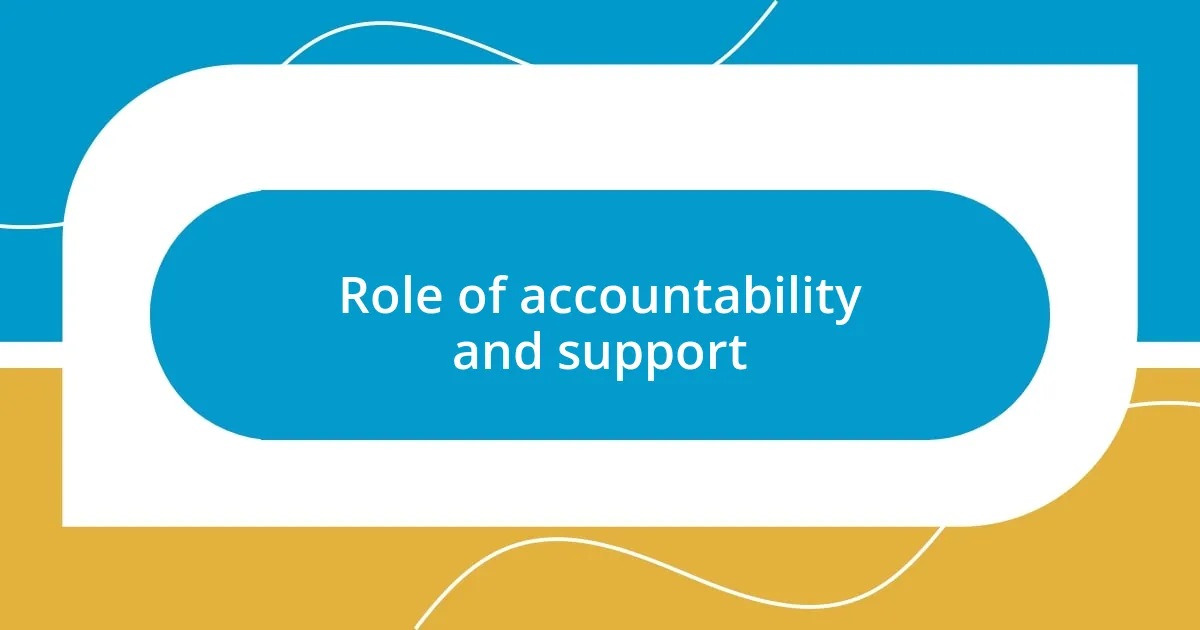
Role of accountability and support
The role of accountability in building new habits cannot be overstated. Personally, I’ve found that simply telling a friend about my goals adds a layer of commitment that I can’t ignore. For instance, I once shared my ambition to start meditating daily with a close friend. Every week, we checked in with each other, and knowing that someone else was invested in my progress compelled me to stick with it, even on days when I felt like giving up. How powerful is that connection we create through shared intentions?
Support systems also play a crucial role in maintaining motivation. I vividly remember when I struggled to maintain my running routine. Joining a local running group transformed my experience. Not only did we cheer each other on, but we also shared tips, setbacks, and successes. This camaraderie meant I had people waiting for me at the park, which made it much harder to skip a session. Have you ever thought about how having others alongside you can elevate the journey?
Moreover, the emotional support from accountability partners might surprise you. I recall a particularly tough week when I felt overwhelmed by my writing goals. I shared my feelings with my writing buddy, and she reminded me that it’s okay to ebb and flow in creativity. Just that simple conversation lifted my spirits and redirected my focus. It made me realize how much lighter the path feels when having someone to lean on. Supporting one another creates a sense of unity, propelling us forward. Don’t you think we thrive more effectively in a community setting?
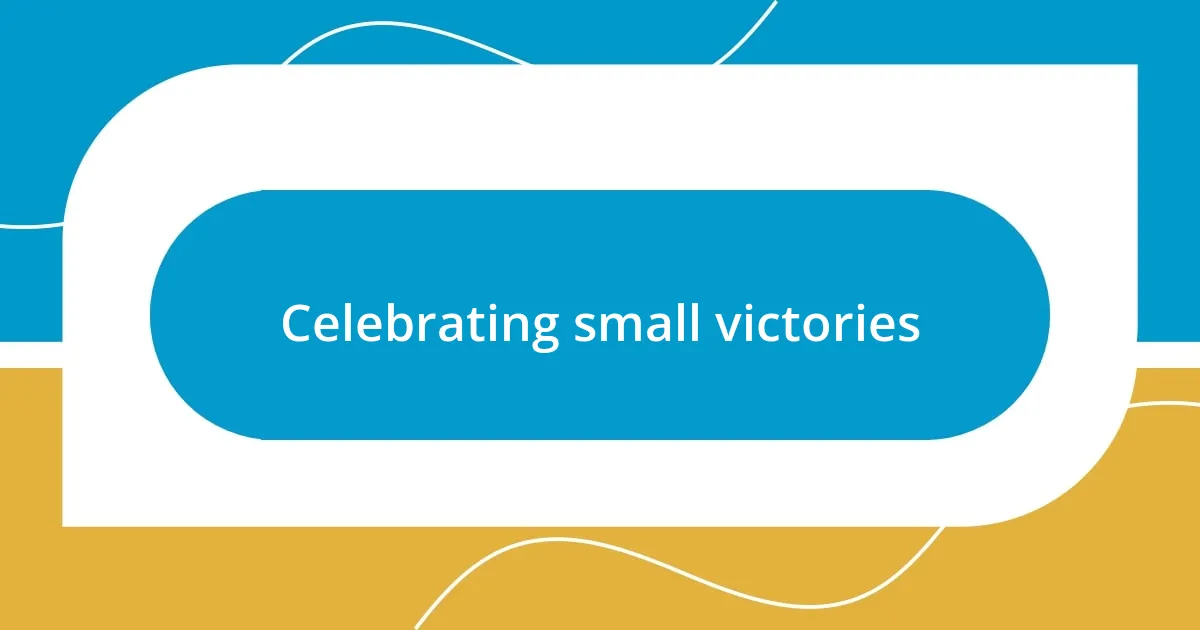
Celebrating small victories
Celebrating small victories is something I’ve come to cherish in my journey of making and breaking habits. For instance, when I successfully woke up ten minutes earlier to meditate, I didn’t just let it slide. Instead, I treated myself to a cozy breakfast with my favorite tea that day. How rewarding it felt to acknowledge that small change! It really highlighted that every little step counts and deserves recognition.
I’ve also found that tracking these small wins can significantly boost my motivation. When I started journaling about my progress, I noticed a pattern: the more I acknowledged my efforts, even the tiniest ones, the more energized I became. One time, after completing a week of daily gratitude exercises, I celebrated by binge-watching a series I’d been dying to see. It motivated me to keep going! Doesn’t it feel amazing to reward yourself in a way that reinforces good habits?
Embracing these moments of celebration has taught me to cultivate a positive mindset as I build my habits. Just the other week, I finished reading a challenging book on personal development. Rather than glossing over it, I shared the accomplishment with close friends during our catch-up. We ended up discussing our favorite parts, deepening our connections and highlighting that even small successes create room for richer conversations. Isn’t it beautiful how celebrating tiny milestones can weave into the fabric of our relationships?












